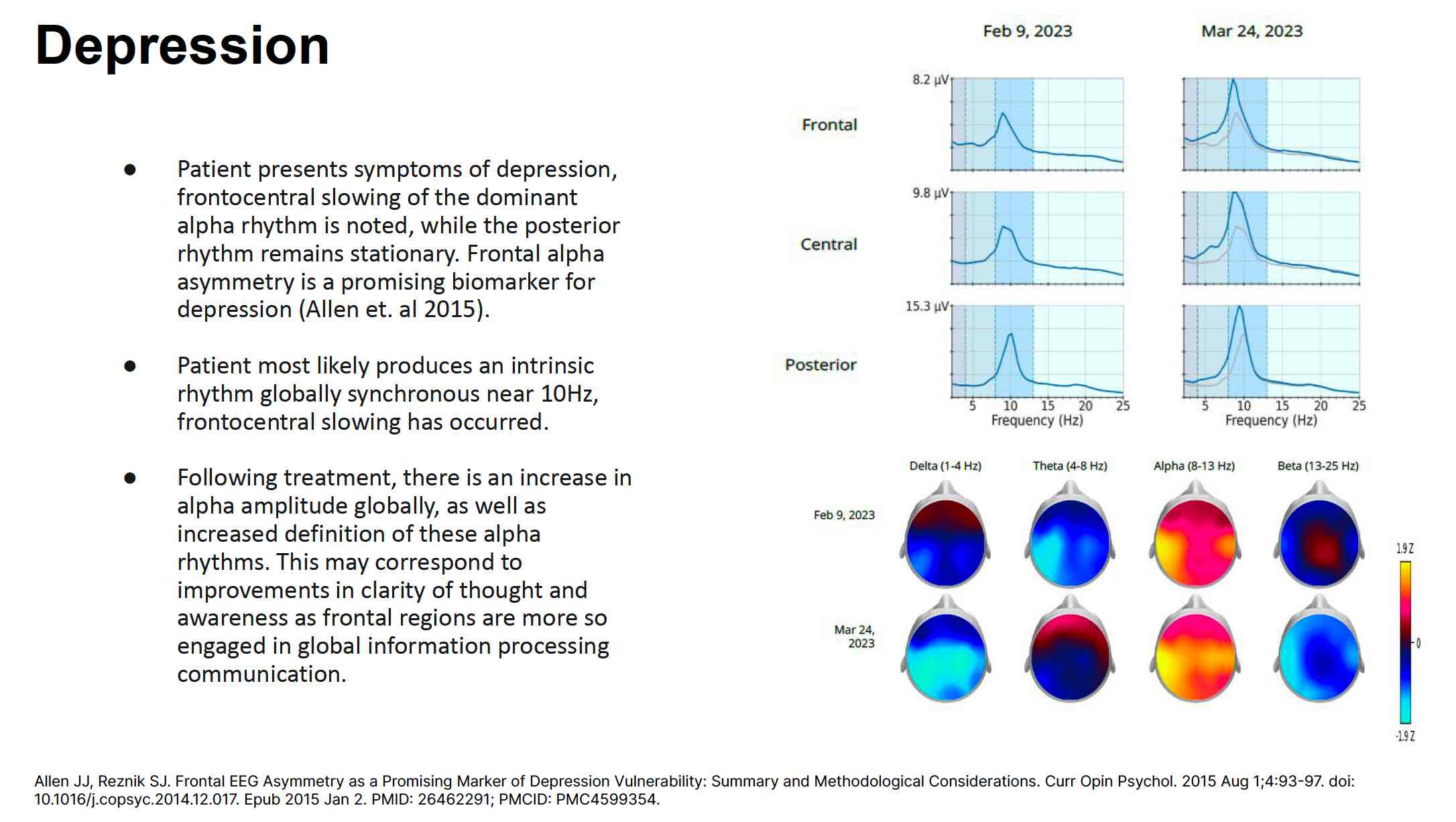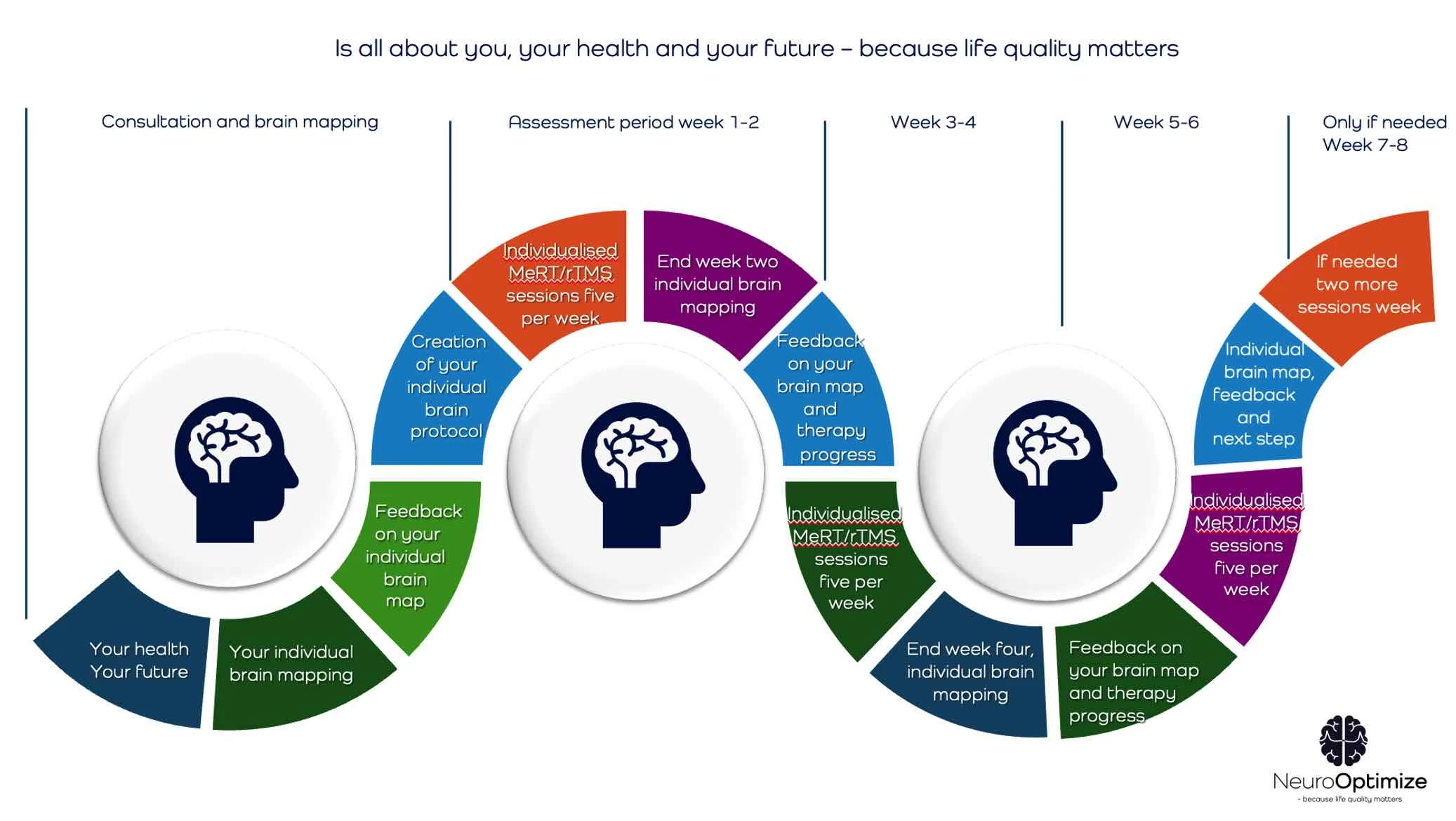What is TMS?
Transcranial Magnetic Stimulation (TMS) is a gentle, medication-free, and non-invasive form of brain stimulation achieved by placing a coil on the head to stimulate specific areas of the brain. Repetitive TMS (rTMS) typically occurs over a period of 6-8 weeks, with sessions scheduled 5 days a week. Each session lasts between 20 to 35 minutes. During the treatment, the client will be fully awake, sitting comfortably in a chair, and attended by registered TMS technicians.
How Do We Do It?
After receiving a referral from your regular care team or following an initial consultation with one of our doctors, you will meet with a TMS-trained psychiatrist. They will explain the TMS procedure, ensuring you understand it fully and have the opportunity to ask any questions. Once you have been screened and have given your consent, you will attend our clinic Monday to Friday for approximately 30 minutes each day. The ability to start treatment is limited to the availability of the psychiatrist and the waitlist for treatment.
You will be in a comfortable, private room with a TMS technician, where a magnetic coil will be placed on your head. This process is very well tolerated, with minimal side effects. Our clinic has a variety of mental health-trained clinicians on-site who are available to address your concerns and take the time to get to know you.
Side Effects
The side effects of TMS are generally mild and short-acting. Some potential side effects include mild scalp irritation, light-headedness, and mild headache, which can last 1-2 hours and typically respond well to over-the-counter analgesics or other adjustments made by the technician during your session. A very rare side effect is the occurrence of a seizure.
Who is the Treatment For?
TMS is approved for treatment-resistant depression and has been shown to be helpful for a number of other mental health disorders such as Obsessive Compulsive Disorder (OCD), pain management, tinnitus, PTSD, and more. Currently, in Australia, Medicare and DVA approves and provides rebates for TMS for treatment -resistant depression. Please speak to one of our healthcare team members to see if you are eligible for a Medicare or DVA rebate.
Who Cannot Receive TMS
TMS is not suitable for patients with the following conditions or implants:
- Pacemaker
- Defibrillator
- Vagal Nerve Stimulator
- VP Shunt (functional and non-functional) / Magnetic intracranial shunts
- Deep Brain Stimulator implant
- Epidural Cortical stimulator
- Steel shunts/stents/filters
- Cranial metal fragments (excluding titanium)
- Aneurysm clips, coils, pipeline flow diversion
- Cochlear implant
- Pregnancy or breastfeeding
- Primary or metastatic brain cancer
- Magnetic dental implant
- Ocular (eye-related issues)
- Uncontrolled seizure disorder
Patients with the following conditions should discuss their situation with their doctor, as these may require special consideration:
- Hearing aids
- Magnetic ink tattoos
- Bipolar Disorder Type 1 and 2
- Epilepsy/history of seizure
- History of psychosis/schizophrenia
We are currently collaborating and planning studies using MeRT together with universities, and other strong partners.
What is MeRT
MeRT, is the abbreviation for Magnetic e-Resonance Therapy. It is a highly personalised use of repetitive Transcranial Magnetic Stimulation, or rTMS, based on measurement of individual brain waves. The technology is patented and developed in the United States and registered under the name MeRT.
At NeuroOptimize, we use the term MeRT for our research treatments, which is the patented name for the specific rTMS protocol developed by our US partner. MeRT is an Electroencephalogram (EEG)-based rTMS treatment that is personalised to the individual brain. Our partners have collected data through more than 35.000 treatments and continue to innovate, learn and build algorithms. This represents the largest database of pre-post-treatment EEGs in the world.
How it is done.
The brain is stimulated by magnetic stimulation. This helps change disruptions in ways the brain is speaking to its different parts. Managing these disruptions can help people manage their symptoms.
Through an EEG recording (brain report), we analyse your brain pattern of function to detect possible abnormalities and to state your individual optimal neural synchronisation.
We measure the progress several times during treatment to make sure that you benefit from it and do not have treatments if you are non-responsive. We can often see that during the first two weeks of treatment.
MeRT is used to balance the coordination between your frontal lobes and your back lobes (occipital). The system reprograms dysfunctional electrical signals and restores functions.
We treat you as an individual person with individual brain patterns to find the ideal state of your brain functions. This can lead to significant improvements for your brain and, therefore, improve your life quality.
The brain - Why do we want to know more?
The human brain is unique
The human brain contains approximately 100 billion neurons. That is an amazingly complex organ, and when its functions are optimal, it supports us in becoming our intrinsic best selves.
The brain waves or electrical oscillations control, through billions neurons, how our brain functions.
When the frontal lobes and the back lobes are not synchronised, our brain performance slows down. Both internal and external forces can disrupt this synchronisation. Research also shows that age, sleep disorders, stress, and emotional trauma or addictions slow down brain functions. That means that the quality and behavior between our neurons can disrupt many things, and for some, they disrupt our life quality.
Neurons are known as “information messengers,” and they deliver messages through electrical impulses.
Please see below the example of a client with depression.

The process is designed with research partners and may follow this pathway:


